|
|
|
Sort Order |
|
|
|
Items / Page
|
|
|
|
|
|
|
| Srl | Item |
| 1 |
ID:
158328
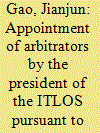

|
|
|
|
|
| Summary/Abstract |
The authority vested in the President of the ITLOS by article 3 of Annex VII to the LOS Convention to appoint arbitrators for the Annex VII arbitral tribunal is important for the effective operation of the dispute settlement system established by the LOS Convention as well as for the ITLOS itself. There are some apparent irregularities in the practice of the President so far, and the transparency of the appointment process needs to be enhanced.
|
|
|
|
|
|
|
|
|
|
|
|
|
|
|
|
| 2 |
ID:
158330
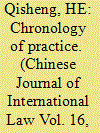

|
|
|
|
|
| Summary/Abstract |
This paper is composed of materials reflecting the practice of private international law in China in 2016. First, this paper covers the report of the Supreme People’s Court (SPC) released in 2017, notably the Report on the Work of the SPC in 2016, which contains the statistics of the foreign-related civil or commercial cases accepted and concluded by Chinese courts. Second, the paper covers judicial interpretations that took effect in 2016. The important legal instruments that have been translated include: the Provisions of the SPC on Several Issues concerning the Trials of Independent Guarantee Cases and the Provisions of the SPC on Several Issues concerning the Adjudication of Cases Occurring in the Sea Waters under China’s Jurisdiction (I). Third, this paper focuses on typical cases decided by various Chinese courts during 2016 that dealt with the following issues: agent ad litem; jurisdiction (involving representative office and forum non conveniens); choice of law (classification of legal relationship, gambling debt, loan contract); proof of foreign law; recognition and enforcement of a Singapore judgment; validity of the dispute resolution clause containing both litigation and arbitration; recognition and enforcement of foreign arbitral awards (involving the review at the request of the party or ex officio review by the court, procedure review, qualification of arbitrator, division of arbitration costs, excess of authority and division of an arbitral award, and public policy).
|
|
|
|
|
|
|
|
|
|
|
|
|
|
|
|
| 3 |
ID:
158325
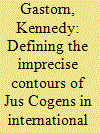

|
|
|
|
|
| Summary/Abstract |
The concept of jus cogens or “peremptory norms” is not new to students and practitioners of international law, but the practical identification and application of jus cogens norms is not without its own set of disagreements and debate. The purpose of this paper is to identify some of the details of the development of the common understanding of jus cogens within international law, with particular emphasis on the Asian-African perspective, and to outline the work of the International Law Commission (ILC) on the topic since its inclusion on the ILC’s work programme in 2015.
|
|
|
|
|
|
|
|
|
|
|
|
|
|
|
|
| 4 |
ID:
158327


|
|
|
|
|
| Summary/Abstract |
This article analyses how the International Criminal Court dealt, in the case of Al-Mahdi, with the crime of intentional attacks directed against protected cultural heritage sites. The case is discussed in the context of the previous experience and jurisprudence of other international criminal tribunals in prosecuting and punishing the perpetrators of cultural heritage crimes. In this respect, the article examines the complementary function of international criminal justice in relation to the shortcomings of national criminal jurisdictions. It also deals with a set of fundamental issues emerging at the junction of the international protection of cultural heritage and individual criminal responsibility, being the gravity of international crimes; cultural genocide as affecting the identity of a group; and the primary obligation of States to exercise criminal jurisdiction over individuals. The core aim of the article is thus to critically analyse the extent to which the ICC judgment in Al-Mahdi may be seen as a breakthrough towards a more efficient international mechanism for counteracting impunity in crimes against cultural heritage.
|
|
|
|
|
|
|
|
|
|
|
|
|
|
|
|
| 5 |
ID:
158326


|
|
|
|
|
| Summary/Abstract |
If anything, the recent cases of intervention by invitation highlight an urgent need for the reengagement of international lawyers in this topic. It is this need which informs this article’s commitment to reexamining the issues associated with intervention by invitation. The first question which comes to mind is whether the exercise of intervention by invitation can really be deemed to be a legal enterprise? If so, what conditions can be said to bestow legality upon a resort to intervention following invitation? To answer these questions, this essay maps out the differences between intervention by invitation and collective self-defence against armed groups and concludes that it is a grave mistake to downplay the important role undertaken by the test of effective control in the context of intervention by invitation.
|
|
|
|
|
|
|
|
|
|
|
|
|
|
|
|
| 6 |
ID:
158324
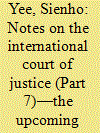

|
|
|
|
|
| Summary/Abstract |
The request for advisory opinion on the separation of the Chagos Archipelago puts in play (1) the cause of decolonization and the Court’s participation in the UN’s work in this regard and (2) the consent principle in international dispute settlement. Part II reviews in broad outline the law on this matter, which requires that the giving of an advisory opinion by the Court can only be done in a way compatible with its judicial character and with full respect for the consent principle. Part III argues that the giving of an opinion that would concern the main issues in a bilateral dispute without the requisite consent of the parties or that would have the effect of circumventing the consent principle would be incompatible with the Court’s judicial character and would constitute a compelling reason calling for the Court’s refusal to give the requested advisory opinion on such issues. Part IV elaborates that the fact that fully answering the questions put to the Court would necessitate addressing the main or essential issues, including the lawfulness of the detachment of the Chagos Archipelago from Mauritius and ultimately the validity of the detachment agreement, in the bilateral dispute between the Mauritius and the United Kingdom without the latter’s consent, and would be incompatible with the Court’s judicial character, is a compelling reason calling for the Court’s refusal to give the requested opinion on such issues. Part V maintains that in the light of decolonization being a Charter-mandated, important and traditional aspect of the UN’s work, if the Court feels compelled to give an advisory opinion, it may do so on what law may be applicable to, but not on how that law applies to, the main or essential issues involved in the bilateral dispute between the two States, especially the lawfulness of the detachment of the Chagos Archipelago from Mauritius and ultimately the validity of the detachment agreement. This approach may afford the best benefits to both sides. Part VI briefly concludes the paper.
|
|
|
|
|
|
|
|
|
|
|
|
|
|
|
|
| 7 |
ID:
158329
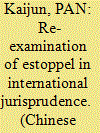

|
|
|
|
|
| Summary/Abstract |
Estoppel is a principle of international law recognized by the International Court of Justice, the International Tribunal for the Law of the Sea and other courts and tribunals. And international courts and tribunals are generally consistent in setting out the requirements for invoking this principle. Nevertheless, international lawyers still doubt “its incidence and effects” and sometimes get confused with its relationship with other concepts. This article further clarifies the requirements of estoppel based on past jurisprudence. On this basis it argues that acquiescence can be regarded as a special form of estoppel. Estoppel and tacit agreement, unilateral declarations and bilateral custom are similar legal regimes but they should be distinguished from each other to avoid fragmentation. Estoppel properly defined can contribute to mutual trust and stability in the international community.
|
|
|
|
|
|
|
|
|
|
|
|
|
|
|
|
|
|
|
|
|